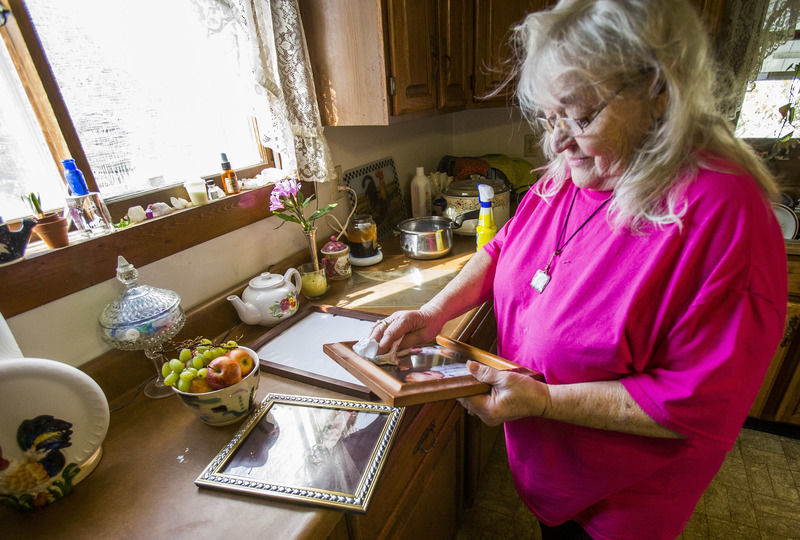
Alma Glisson looks at pictures of her son, Nicholas
“Not many days
And your house will be full of men and women
weeping,
And curses will be hurled at you from far
Cities grieving for sons unburied, left to rot”
Alma Glisson only wants justice. Alma Glisson is the mother of Nicholas Glisson, whose life ended in tragedy. He was murdered by the State while in the custody of the Indiana Department of Corrections. On February 21, the United States Court of Appeals for the Seventh Circuit decided that [a] something terrible had happened to Nicholas L. Glisson and [b] his mother had the right to pursue the entire institution that had killed her son. The Court’s decision offers a heartrending account of institutional malice: “Nicholas Glisson entered the custody of the Indiana Department of Corrections on September 3, 2010, upon being sentenced for dealing in a controlled sub- stance (selling one prescription pill to a friend who turned out to be a confidential informant). Thirty-seven days later, he was dead from starvation, acute renal failure, and associated conditions. His mother, Alma Glisson, brought this lawsuit …. She asserts that the medical care Glisson received at the hands of the Department’s chosen provider, Correctional Medical Services, Inc. (known as Corizon) violated his rights.”
In 2003, Nicholas Glisson was diagnosed with laryngeal cancer, for which he underwent radical surgery. His larynx, part of his pharynx, parts of his mandible and 13 teeth were removed. As a result, he had a tube in his throat and needed a voice box to speak. The surgery and ongoing radiation weakened Nicholas Gilson’s neck to the point that it could not support his head. As a result, his head slumped forward, impeding his breathing. To breathe, he needed a neck brace. Then Nicholas Glisson developed cervical spine damage. In 2008 doctors placed a tube in stomach for supplemental feeding. Nicholas Glisson also suffered from hypothyroidism, depression, and damage resulting from his smoking and excessive alcohol use. Finally, there was some evidence of cognitive decline.
As the court noted, “Despite all this, Glisson was able to live independently. He learned to clean and suction his stoma. With occasional help from his mother, he was able to use his feeding tube when necessary. He was able to swallow well enough to take his food and other supplements by mouth most of the time. His hygiene was fine, and he helped with household chores such as mowing the lawn, cleaning, and cooking. He also provided care to his grandmother and his dying brother.”
Everything changed when a “friend”, actually a police informant, persuaded Glisson to give him a prescription painkiller. Glisson was charged and convicted to ten years in prison … for one Oxycontin pill. On August 31, 2010, Nicholas Glisson was convicted, sentenced and transferred to the Wayne County Jail. His doctor wrote a letter to the court, which concluded, “This patient is severely disabled, and I do not feel that he would survive if he was incarcerated.” Nicholas L. Glisson, 50 years old, died, or was killed, on October 10, 2010.
When Glisson was sent to Wayne County Jail, Alma Glisson made sure he had his neck brace, medicine, and suction machine. No one in authority seems to know what happened when Nicholas Glisson was transferred to Plainfield Correctional Facility. His neck brace never arrived. His voice box was often out of reach. On the morning Nicholas Glisson died, the suction machine used to clear his throat was outside his cell.
Nicholas Glisson couldn’t eat, and so slowly, painfully, starved to death. For 37 days, according to the Court decision, Nicholas Glisson presented the symptoms of a person suffering starvation and renal failure. His body weight, behavior, blood tests and more showed this. Finally, he was sent to hospital … and then returned to the prison. The hospital discharge included the following: “Acute renal failure/acidosis/hyperkalemia on top of chronic kidney disease; acute respiratory insufficiency/pneumonia; tracheoesophageal voice prosthesis replacement; hypothyroidism; malnutrition; squamous cell carcinoma of left lateral tongue; hypertension; chronic pain; dementia/psychological disorder/depression; pressure wound on the sacrum.” This is only a partial list.
Throughout the 37 days, Alma Glisson called Plainfield every day, “`Is he getting his medicine?’ Nobody seemed to know. They assured me he was OK.” She was never allowed to see her son. Alma Glisson was not allowed to visit her son while he was in the hospital. This is how she found about his death: “Some lady called and said, `I’m sorry to tell you your son passed.’ I said, ‘Oh my God, you killed my son!’”
What happened to Nicholas Glisson? The ordinary torture of chronically ill prisoners that passes for care. As Chief Judge Diane Wood concluded: “Nicholas Glisson may not have been destined to live a long life, but he was managing his difficult medical situation successfully until he fell into the hands of the Indiana prison system and its medical-care provider, Corizon. Thirty-seven days after he entered custody and came under Corizon’s care, he was dead. On this record, a jury could find that Corizon’s decision not to enact centralized treatment protocols for chronically ill inmates led directly to his death.”
Alma Glisson agrees, “The issue is justice.” The issue is justice.
(Photo Credit: South Bend Tribune / Robert Franklin)